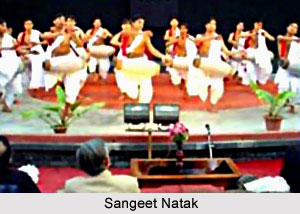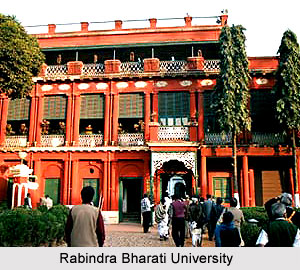 Institute of Factual Theatre Arts (I.F.T.A.) is a product of contemporary Bengali theatre and is distinguished entertainment group and working in this particular field since 1998. In the Mainstream Proscenium, the group is working sincerely to make a permanent mark. However, the group has not restricted its limits only at proscenium theatre, but street theatre, intimate theatre, poster drama and other theatre forms. The experimentation continued to yield excellence for Institute of Factual Theatre Arts, reflecting in the increasing popularity of production, as well as the group.
Institute of Factual Theatre Arts (I.F.T.A.) is a product of contemporary Bengali theatre and is distinguished entertainment group and working in this particular field since 1998. In the Mainstream Proscenium, the group is working sincerely to make a permanent mark. However, the group has not restricted its limits only at proscenium theatre, but street theatre, intimate theatre, poster drama and other theatre forms. The experimentation continued to yield excellence for Institute of Factual Theatre Arts, reflecting in the increasing popularity of production, as well as the group.
On one hand, the theatre group was increasing its web of social work in the country. Mainstream contemporary theatre usage by I.F.T.A. was on full swing. The group premiered KI-KAN-DO, a satire drama at Rabindra Sadan in 2002. Then in 2003 it launched Ritu Sukhe Bibarno Kavita, a theatrical conflict between libido crisis and continuous transformation of the conjugal life. In 2003, another short play named MAA, inspired from Mother by Maxim Gorky, was staged. In 2004, the Institute of Factual Theatre Arts had launched its first bilingual production Chitrangada, a mythological journey of metamorphosis, inspired from Tagore`s dance drama `Chitrangada`. For the first time the director tried to explore a new form, staying away from the drawing room pattern. Live music, Folk Elements, Martial Art, Chhou (traditional masked dance from West Bengal) and known folk form and songs of Tagore were used to design the drama.
The novelty and musical format used by the numero uno Institute of Factual Theatre Arts, earned them invitation at two consecutive National Youth Festivals (2005 and 2006). The production won an esteemed gold in 2005. In the present times, the theatrical group had worked in its new production Sacrifice, premiered at Rabindra Sadan on 6th March 2007.
Institute of Factual Theatre Arts also had produced "SACRIFICE", a bilingual play borrowed from the text of Rabindranath Tagore during 2007. The premier show has been stages on 6th March 2007 at the Rabindra Sadan auditorium; and since then it has been performed ten times. By this solemn effort, the contemporary Bengali theatrical group wanted to create a new format of theatre; they wanted to create a new language of theatre. As the IFTA-ians believe, `theatre does not require any particular language to establish a visual effect and to communicate with the audience`. Hence, Institute of Factual Theatre Arts made use of bilingual Bengali and English form.
 As a sweeping gesture towards popularity and acceptance, I.F.T.A. had performed SACRIFICE once more at the festival of Sangeet Natak Academy on 29th January 2008 in Patna. Then on 8th March 2008, the same play had been re-staged by I.F.T.A. at the festival of West Bengal Natya Academy at Rabindra Sadan auditorium. Institute of Factual Theatre Arts had achieved the invitation from Pataliputra Natya Mahotsav authority and performed for the same SACRIFICE on 10th April 2008 in Patna. In present times, I.F.T.A. had fully utilised and done their homework on the structural work for its new bilingual play PATH. This new play had been taken from Rabindranath Tagore`s original text WATERFALL, which was premiered on 26th June 2008 at the Rabindra Sadan auditorium.
As a sweeping gesture towards popularity and acceptance, I.F.T.A. had performed SACRIFICE once more at the festival of Sangeet Natak Academy on 29th January 2008 in Patna. Then on 8th March 2008, the same play had been re-staged by I.F.T.A. at the festival of West Bengal Natya Academy at Rabindra Sadan auditorium. Institute of Factual Theatre Arts had achieved the invitation from Pataliputra Natya Mahotsav authority and performed for the same SACRIFICE on 10th April 2008 in Patna. In present times, I.F.T.A. had fully utilised and done their homework on the structural work for its new bilingual play PATH. This new play had been taken from Rabindranath Tagore`s original text WATERFALL, which was premiered on 26th June 2008 at the Rabindra Sadan auditorium.
Institute of Factual Theatre Arts started its eventful journey in 1998. A fresh batch of theatre workers with dream in their eyes had started this journey. The group had wished to do theatre in a distinct form and style. These gifted men are of the belief that Bengali folk culture possesses immense potential within it. The precise work that I.F.T.A.-ians are trying to perform is to modernise these elements into their productions. In search of this specified form, the group is inspired from different productions of Mr. Ratan Thiyam. They are trying to bring back the traditions of Gambhira, Letto, Alkap, Chhou Purulia, Raibeshe through theatrical productions. At the same time, performers are trying to reconstruct the economic structure of theatre.
The crisis, through which theatre workers are passing at present, is horrifying. In order to find a solution to this profound problem, Institute of Factual Theatre Arts is trying to design specified methods of earning. Tying up with different N.G.Os, this contemporary Bengali theatre group is managing some funds and call shows. In order to achieve this uphill task, the group is paying their performers a humble token amount as their first step. The group is also striving to find more alternative ways and concepts for the same reason. Institute of Factual Theatre Arts is also trying to counter various social hazards by the help of their unique weapon theatre. For this noble gesture, I.F.T.A. is trying to spread awareness regarding child labour, protection of women from domestic violence, child-immunisation, AIDS etc. The group is also going through different workshop processes with different groups of people for enabling them to speak about their own problems. The performers have had exceptional success working with adolescent girls of different conservative communities. I.F.T.A. owns a special wing of children theatre, which is made of the children, for the children and by the children. They perform on a regular basis in different auditoriums of Kolkata. However, Institute of Factual Theatre Arts honestly needs to build up on infrastructure, economic stability for the workers and stage productions of innovative approach and attitude.
Debasish Dutta, one of the ex-students of Rabindra Bharati University Drama Dept. had directed his first production named Alabdha Banchha. This is the man who had strived to establish Institute of Factual Theatre Arts into a unified whole. Dutta had trained under theatre personalities in the workshops of Sri Ratan Thiam, Sri K.N. Pannikkar, Sri Nisar Alana and many more. Since 1998 to present times, Debasish Dutta directed 16 productions for I.F.T.A. in Bengali, English and Hindi. Some of those comprise: Ek je chhilo Bengali, Ki kando Bengali, Hritu sukhe bibarnno kavita Bengali, Maa Hindi, Bhut bhagaban Hindi, Chitrangada (English), Sacrifice (English). During 1998, Debasish had attended a Directors workshop organised by West Bengal Natya Academy, the workshop Director being Sri Arun Mukhopadhyay. In 1998, Debasish participated in a Script Writing Workshop organised by Natya Samannya, with the workshop director as Sri Debasish Mazumder. In the Natya Samannya workshop, a drama written by Debasish Dutta named Aparajita made a special impact. In the same year he formed a theatre group, Institute of Factual Theatre Arts (I.F.T.A.) and since that time he has been involved with that particular Institution as its Director.
In the year 2001, Debasish attended the Central Workshop of Theatre. While into that period, he gained inspiration from some vibrant characters of the theatre world, like Sri Kumar Roy, Sri Tapas Sen, Sri Rudraprasad Sengupta, Smt. Sohag Sen, Sri Pabitra Sarkar, Sri Suman Mukhopadhyay, Smt. Usha Ganguli and many more. In 2002, Debasish Dutta attended the Mime workshop arranged by West Bengal Natya Academy, where he got in touch with India`s most stellar mime artist, Sri Jogesh Dutta. In 2002, Debasish participated in the festival arranged by Department of Sports and Youth Services Govt. of West Bengal. In the festival, his directed play MAA induced a profound impact on viewers. In 2004, with escalading admiration, Dutta participated in Young Theatre Artist Workshop, Shantiniketan, organised by Sangeet Natak Akademi. The workshop director was Sri Bibhas Chakrabarty. In 2005, Debasish carried his directed play Chitrangada to the West Bengal Youth Festival, topping the prize list. In the same year, Debasish took the same production for 10th National Youth Festival, Hyderabad and earned the gold medal. In 2006, Debasish Dutta presented the same production again in the 11th National Youth Festival, Patna and earned accolades. Once more in 2006, he participated in the Young Theatre Artist Workshop East Zone, Phase II, Kolkata, organised by Sangeet Natak Akademi. The workshop director was Sri Satish Anand. Debasish has been fortunate enough to get in touch with India`s creme-de-la-creme in the theatrical sphere, thus going on to become a maestro himself and establishing Institute of Factual Theatre Arts.




















